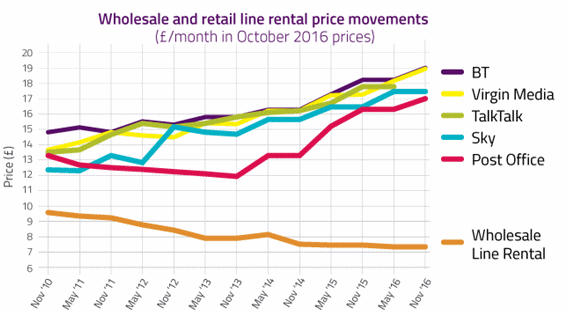Ofcom Nudge BT to Slash UK Standalone Monthly Line Rental Costs by £7
Consumers who take a landline-only phone service from BT will, from 1st April 2018, pay £7 per month less for their line rental following a decision by Ofcom (i.e. £11.99 inc. VAT per month instead of £18.99). The move will benefit up to 1 million of the operator’s customers, especially elderly users.
The decision stems from the regulator’s Narrowband Market Review, which last year noted (here) that telephone line rental prices had risen sharply over the past few years (partly to help balance against the rising cost of service provision in other areas (broadband) and lost revenues from voice calls). Ofcom found that in recent years the price has risen by between 23% and 47% in real terms, while the underlying wholesale cost has fallen by c.27%.

The regulator noted that customers who purchased bundled services (e.g. broadband, mobile, line rental and or TV) often benefit from big discounts, but sadly this didn’t apply to those who buy landline services on their own. This is often “felt most acutely” by elderly and vulnerable people who tend to shun bundles and stick with the same provider / standalone line rental product for years.
Advertisement
On average, landline-only customers have been with their provider for more than 20 years, compared to 8 years for phone with broadband customers, and 4 years for triple-play customers. Nearly two thirds (66%) of customers with only a landline are aged 65+ and more than three quarters (77%) have never switched provider.
Apparently around two thirds of these landline-only customers (there are close to 1.5 million in the whole of the UK) come from BT and many of those take broadband from another ISP, while the remaining million take either BT Basic (social tariff) or Home Phone Saver.
Ofcom’s change means that at least 800,000 of BT’s landline-only customers will benefit from the reduction automatically (they will also be protected from real-term price increases, with line rental and call costs capped at the rate of inflation). A further 200,000 customers on the operator’s ‘Home Phone Saver’ package may also be eligible (i.e. they will be given the option to move to the cheaper service, depending on which is the best deal).
Jonathan Oxley, Ofcom’s Competition Group Director, said:
“For many people, their landline is their lifeline.
But households who only have a landline – and no broadband – have seen their phone bills soar. Many are elderly, and have been with BT for decades. We’ve been clear that they must get a better deal. So I’m pleased BT has responded to our plans in full by cutting these customers’ bills.”
A BT Spokesperson said:
“We welcome a balanced voluntary agreement with Ofcom which means that up to 1m of our customers who don’t have broadband will receive a substantial cut in the price of their line rental from April 2018.
We have listened to the concerns of our line-only customers and agreed to reduce the price of line rental for them by £7 a month, or £84 a year, which means they will only pay £11.99 a month for standard line rental.
This will come in to effect from April 2018 for all landline-only customers who just take phone services from us and don’t have broadband (either with BT or someone else).
We already offer low income customers on certain benefits a special tariff called ‘BT Basic’ and also offer Home Phone Saver that provides a great value bundle for customers who want a traditional phone service, with Anytime calls and other benefits.”
The agreement also requires BT to help those who buy a telephone service from one provider and broadband from another, albeit only by explaining that they could get a better deal if they purchased such services as part of a bundle. The regulator hopes that other operators will now follow BT’s lead, although they aren’t currently required to do so.
Advertisement
The 37% price cut (an annual saving of £84) will no doubt be welcomed by those who stand to benefit, although it’s not uncommon for operators to recoup any losses by increasing their prices in other areas and thus all eyes will be on next year’s annual price hike to see what changes are made (another possible tactic is to bring related price hikes forward by a few months).
Separately, Ofcom’s Narrowband review suggests that “regulation of voice services may no longer be necessary in future. In our next review, it may be possible for us to entirely remove wholesale regulation of lines and calls, if we find that competition is delivering for consumers or because other forms of protection are sufficient or appropriate.”
Mark is a professional technology writer, IT consultant and computer engineer from Dorset (England), he also founded ISPreview in 1999 and enjoys analysing the latest telecoms and broadband developments. Find me on X (Twitter), Mastodon, Facebook, BlueSky, Threads.net and Linkedin.
« Churchill Gardens Named Largest FTTH Broadband Estate in Central London


















































Comments are closed